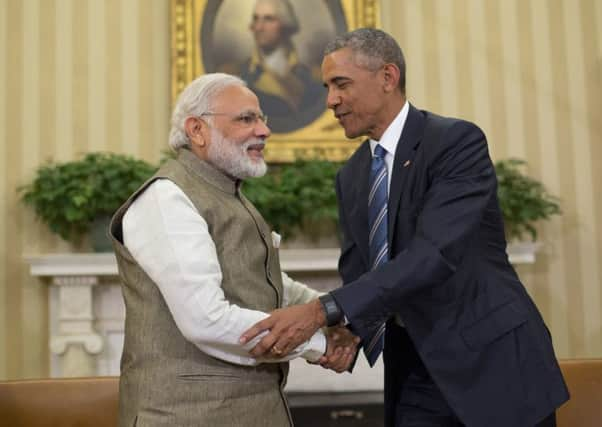India gets closer to joining elite group '¨of nuclear powers


Newspapers have run daily front-page stories heralding progress on the nuclear front after President Barack Obama came out in support of Indian membership of the Nuclear Suppliers Group, which led other nations, including Mexico and Switzerland, to suggest they, too, were on board. Diplomats in Vienna suggested that India is closer than ever to joining the NSG, despite never fulfilling the requirement of signing a global treaty aimed at preventing the proliferation of nuclear weapons and weapons technology.
But some analysts say India’s entry will make no difference, at least not from a technical standpoint. The nation has already managed to secure access to nuclear fuel and technology to build the power plants it says it needs to boost energy capacity and drive economic growth for the nation of 1.25 billion people.
Advertisement
Hide AdAdvertisement
Hide AdAnalysts say joining the NSG is chiefly a matter of pride. Since prompting international technology sanctions and limits on exports by conducting nuclear tests in 1998, India has been eager to gain legitimacy as a nuclear power.
“In practical terms, there is nothing extra that the NSG will give India other than a seat at the nuclear high table,” said Rakesh Sood, a retired diplomat associated with India’s nuclear negotiations over the past decade.
India already has deals with more than eight countries for supplies of uranium, and has signed agreements for reactors with France, Russia and the United States.
This week’s reported breakthroughs were seen as a major point of progress for Modi, who has placed new urgency on India’s nuclear ambitions with the aim of vastly expanding atomic power to account for about half of the country’s total electricity supply by 2050.
Nuclear power is one way India, the third-biggest emitter of greenhouse gases, could cut its emissions and reduce air pollution from coal-fired power plants.
India scored a major victory in 2008, under Modi’s predecessor, by securing a waiver from Washington allowing it access to nuclear technology and fuel despite its refusal to sign the Nuclear Non-Proliferation Treaty. But progress in deals to build new plants since then has stalled.
Ironically, the group was set up in response to India’s own clandestine nuclear test in 1974, which made New Delhi a pariah in the West. Joining the club requires the approval of all members.
Analysts said Modi is anxious to secure NSG membership while Obama is still in office, after years of receiving support from his administration.
Advertisement
Hide AdAdvertisement
Hide Ad“It’s a matter of timing. A crescendo is building up; now is the time to clinch it,” said Sheel Kant Sharma, a former Indian ambassador to Vienna, Austria. “Tactically and strategically, it’s time for India to be on the side of those who control technology.”
Last week, Obama hailed India’s membership of the Missile Technology Control Regime, a group that restricts the export of missiles and their delivery systems. Officials also reported progress in resolving an impasse over an Indian liability law passed in 2010 that makes builders of nuclear plants financially responsible for any accidents.
India continues to refuse to sign the non-proliferation treaty, arguing that it is discriminatory since it defines nuclear weapon states as those which tested nuclear devices before January 1967 – which would disqualify India from ever becoming a member.